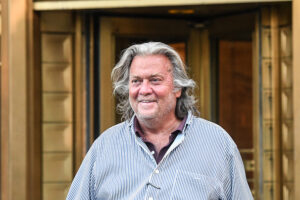Steve Bannon Won't Pay His Lawyers, And He Doesn't Care How Much It Costs Him
Flood the zone with sh*t.

(Photo by Stephanie Keith/Getty Images)
Steve Bannon really doesn’t want to pay his lawyers. In fact, he’s hired a whole new crew of lawyers to make sure that he doesn’t have to pay another penny more to the old guys.
In February, Davidoff Hutcher & Citron LLP sued the MAGA podcaster for $480,487.87 in unpaid fees due to partner Robert Costello. Costello is a Trumpland regular who played a crucial role in publicizing Hunter Biden’s laptop, was accused of dangling a pardon to Michael Cohen during the Mueller investigation, and who testified to the grand jury in New York that Cohen was a liar and a scoundrel before the panel returned an indictment of Trump for making false business records.

Curbing Client And Talent Loss With Productivity Tech
Before DHC sued, the Daily Beast’s Jose Pagliery reported that Bannon had also stiffed attorney Evan Corcoran for his services. Corcoran, Costello, and Trump impeachment veteran David Schoen represented Bannon in last summer’s contempt of Congress trial, at which he was found guilty. For his part, Schoen says that he was paid in full — although he didn’t stick around for the appeal and asked to be let out of the case due to unspecified “differences” with his client.
Bannon’s new counsel Harlan Protass, an experienced criminal defense lawyer, makes some odd arguments in his opposition to DHC’s motion for summary judgment. To wit he claims that Bannon only signed a retainer agreement with respect to his original federal prosecution for the scheme to defraud investors in a home-brew border wall, and thus “a material issue of fact remains in dispute as to whether DHC is entitled to legal fees from Mr. Bannon for work unrelated to the subject of the retainer agreement into which he and DHC entered.”
Trump pardoned Bannon for that caper (although he left Bannon’s confederates to their fate). Costello went on to negotiate with Trump’s lawyers as well as the January 6 Select Committee in an attempt to evade a subpoena on grounds of executive privilege, although Bannon was fired from the White House in 2017. Costello affirmatively entered an appearance in Bannon’s criminal contempt case resulting from that evasion, and his prior work was the basis of Bannon’s doomed effort to assert an advice of counsel defense.
Finally, DHC claims that it represented Bannon in the later state prosecution for the border wall scheme (bolstered by testimony from those abandoned confederates).
Sponsored

Curbing Client And Talent Loss With Productivity Tech

Law Firm Business Development Is More Than Relationship Building


Law Firm Business Development Is More Than Relationship Building
As flagged by the Daily Beast, Bannon swore an affidavit that he never authorized Costello to speak to the FBI on his behalf in December of 2021. That appears to be the second of two meetings in which Costello attempted to persuade prosecutors not to charge the podcaster with contempt of Congress. By all accounts, it went spectacularly badly and wound up with the FBI seeking a warrant for Costello’s own communications.
We wrote last year:
Costello admitted that he had told Bannon that seven of the 17 categories of information subpoenaed by the Committee were not covered by any plausible claim of executive privilege, but that he had advised his client not to cooperate anyway. He also seems to have some odd ideas about privilege, insisting that Bannon’s conversations with Rudy Giuliani and Jenna Ellis were attorney work product, although no one associated with the campaign has ever made that assertion. Similarly, Costello claimed privilege over a conversation he had with his client, despite the fact that former National Security Advisor Michael Flynn was in the room when it took place.
But Costello’s claims about contacts with lawyers for Donald Trump seem the most suspect. Because, as prosecutors point out in their reply brief, Trump never actually asserted executive privilege over his conversations with Bannon, instead making generalized gestures toward any privilege that Bannon might be able to assert. Which makes sense, since Bannon was fired from his White House job in 2017, long before the events leading up to the Capitol Riot. And by November, Costello was crystal clear on the former president’s position, having doggedly but unsuccessfully lobbied Trump’s counsel to change it.
Now Bannon claims that Costello was freelancing in the second meeting, and that he ordered the attorney to stop all work after that. That would seem to be belied by the fact that Costello entered an appearance in and attended the subsequent trial, but YMMV.
So now Bannon proposes to conduct extensive discovery to avoid paying the remainder of his bill. Almost like he despises Costello, whose advice landed him in the same spot as Peter Navarro, who had no lawyer at all, and he’d like to make it as expensive as possible for Costello to collect on that bill.
Sponsored

Generative AI at Work: Boosting e-Discovery Efficiency for Corporate Legal Teams

AI Presents Both Opportunities And Risks For Lawyers. Are You Prepared?
Steve Bannon’s Legal Woes Just Got Even Messier [Daily Beast]
Liz Dye lives in Baltimore where she writes about law and politics and appears on the Opening Arguments podcast.







